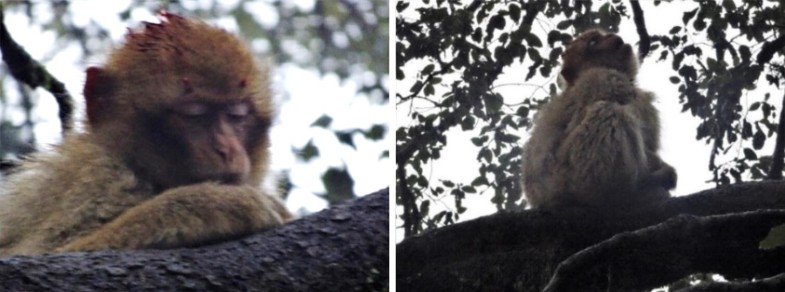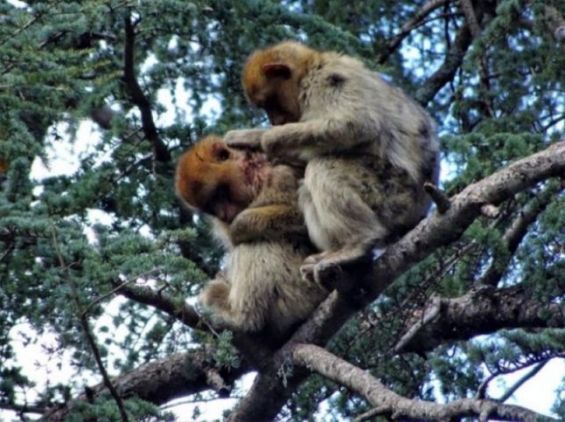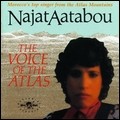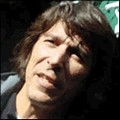Pipo is a 3-year-old Barbary macaque, who helped scientists pin point an unprecedented behavior among the species found in Morocco’s Atlas Mountains. In March, 2018, the juvenile macaque was hit by a car in the Ifrane National Park.
The observations made by a scientist from Oxford University and the International Fund for the Animal Walfare (IFAW) recall that shortly after the accident Pipo attracted the attention of his natal group.
«Members of his group showed distress behaviors, screaming, and protective behaviors, acting aggressively towards observers that tried to approach him», Liz A. D. Campbell, the author of the study published July on scientific journal Primates, wrote.
 Injured juvenile Pipo retreated to a tree after being struck by a car and was left behind when unable to follow his natal group when they moved from the area. / Ph. Liz Campbell
Injured juvenile Pipo retreated to a tree after being struck by a car and was left behind when unable to follow his natal group when they moved from the area. / Ph. Liz Campbell
Suffering a head injury, Pipo climbed a tree and stayed there. At dawn, unable to follow members of his group, Pipo was left behind. Two days after the accident, Pipo was seen repeatedly screaming on the tree where he was left.
Fostering a monkey for four months
Then, an incredible thing happened. Campbell reports that Pipo was approached by a juvenile from a neighboring group called the MonkeyWatch group. The monkey groomed Pipo and consolidated him. «Approximately 20 min later, an adult male also approached and groomed Pipo», who accompanied the MonkeyWatch Group when they «left the area later in the day».
Pipo found himself a new home with the neighboring group. Observations made by the same scientist reveal that the 33-month old monkey was fostered by the MonkeyWatch group for four months, even after his injuries healed.
 Injured juvenile Pipo a screaming alone in a tree at 11:33 (screenshot from Video provided as Online Resource) and b alone on the ground. / Ph. Liz Campbell
Injured juvenile Pipo a screaming alone in a tree at 11:33 (screenshot from Video provided as Online Resource) and b alone on the ground. / Ph. Liz Campbell
During his stay with the neighboring group Pipo was «well socially integrated and was often seen grooming, playing and socializing with others, particularly with the adult male that had first groomed him, a subadult male, an adult female, and other juveniles», the same study indicates.
Promising findings
Pipo returned to his natal group In July, 2018, allowing scientists to discover the unprecedented behavior of the Barbary macaques group. This behavior was dubbed promising by scientists, whoe hope to reinforce the population of the species.
«We thought fostering may only be an option for very young monkeys, but Pipo's case shows even older juveniles can be accepted by wild foster groups», Campbell told Science Daily.
«This observation provides valuable information for rehabilitation and release strategies, which will help improve welfare of rescued macaques, strengthen wild populations, and free space in sanctuaries to allow continued confiscations to fight illegal trade».
Indeed, these observations could make of the efforts made to bring back some Barbary macaques to the wild come true. The objective is to return macaques «rescued from illegal trade» to the wild «through rehabilitation», Science Daily reports.
«The conventional method for returning primates to the wild is rehabilitation and release of groups formed in captivity, but because of the attention and care that Barbary macaques, especially males, give to young, there is the possibility not only to release rehabilitated groups but also to release individual young into foster groups in the wild», Campbell concluded.





 chargement...
chargement...












